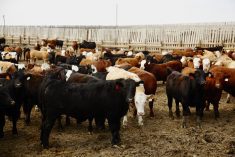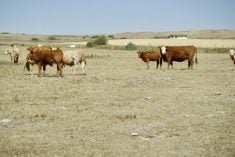Spring is finally here and the busy season on our farms and ranches is upon us — whether it’s calving or getting crops into the ground. There’s something about spring that brings a sense of optimism and the feeling of a fresh start. While you are busy tending to spring preparations, the board and staff at the Canadian Cattle Association (CCA) are monitoring the pulse on policy files that may affect the sustainability of our sector and our ability to grow our beef exports.
For most of 2023, the trade file has kept us busy with issues that can threaten our ability to export Canadian beef. Exports of Canadian beef bring significant added value to our industry and cattle producers and the trade file continued to be the focus of many discussions at our annual general meeting (AGM). With over 50 per cent of Canadian beef heading for international markets, it’s important that policy decisions here at home — and by our key trade partners — provide benefits to producers, the broader industry and consumers in each country. We are working hard to ensure that the interests of beef producers are taken into consideration during these policy discussions and trade negotiations.
We continue to monitor Bill C-282: An Act to amend the Department of Foreign Affairs, Trade and Development Act (supply management), which proposes to take supply-managed sectors off the table during trade talks. We are advocating against Bill C-282 with our partners, including the Canadian Agri-Food Trade Alliance (CAFTA), and appeared before the House of Commons Standing Committee on International Trade to oppose the bill. To emphasize the potential effects of Bill C-282, we are sharing personal stories on social media and in meetings with elected officials about the added value that exports bring to Canadian beef farms and ranches. We invite all producers to bring up their concerns with Bill C-282 with their respective members of parliament and to share their stories on social media.
Read Also

The Canadian Cattle Association’s international advocacy efforts
Global ag policies affect Canadian food policy, so the Canadian Cattle Association participates in international and domestic forums
Another key trade file we have been following with interest is the trade negotiations with the U.K. In late March, CCA was disappointed to see the U.K.’s accession to the Comprehensive and Progressive Agreement for Trans-Pacific Partnership (CPTPP) since it does not achieve viable access for Canadian beef into the U.K.
The CPTPP negotiations with the U.K. were an opportunity for Canada to rectify the significant disadvantages in market access and non-tariff barriers Canadian beef producers face in this market. However, Canada supported the U.K.’s accession without resolving these issues. The full details of the deal are still unavailable, but CCA is aware of other member countries of the CPTPP achieving unlimited beef access in their bilateral agreements with the U.K. while similar access for Canadian beef is off the table. This is a frustrating development for Canada’s beef producers and CCA will continue to advocate for these challenges to be addressed during the Canada-U.K. bilateral negotiations.
The U.K.’s accession to CPTPP requires ratification by the Canadian Parliament. Should a ratification bill be brought forward to Parliament, CCA will approach all parliamentarians to defeat this bill. We have always advocated for free and open trade and this deal only further disadvantages Canadian beef producers.
However, it has not been all negative news on the trade front. Late March saw Japan open its borders to Canadian processed beef after 20 years. This announcement marks the removal of the final BSE-era restrictions in Japan following Canada’s attainment of BSE-negligible risk status by the World Organization for Animal Health in 2021. Japan’s decision to grant full market access to Canadian beef may signal other countries in the ASEAN region to follow suit. This is good news for Canadian cattle producers as the Indo-Pacific region holds the greatest potential for beef export diversification.
Federal Budget Day 2023 also saw good news for the Canadian beef industry with Deputy Prime Minister and Finance Minister Chrystia Freeland announcing an investment of $57.5 million over five years to develop emergency response plans and establish the foot-and-mouth disease (FMD) vaccine bank. CCA has advocated tirelessly over the last number of years for a federally funded FMD vaccine bank which was heightened as an urgent advocacy priority in 2022.
With the threat of FMD remaining high given the recent outbreaks in Asian and African markets, the establishment of this vaccine bank is critical and helps provide our industry with the necessary insurance to protect Canada’s export markets. We appreciate the government listening to our concerns and understanding the critical need to put emergency preparedness plans in place. While we hope we never need to use the FMD vaccine bank, we know it is a critical piece in foreign animal disease emergency preparedness.
With all the activity on the trade front, there wasn’t much time to discuss the outcomes of the CCA AGM in this column either. I’d like to send congratulations to Tyler Fulton, who was elected as CCA’s vice-president in late March. I look forward to working with him and our board members to advance the priorities that were set at our AGM for the next year. We’ve made good and important strides over the last year and there is still much work to be done.
















